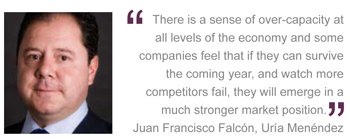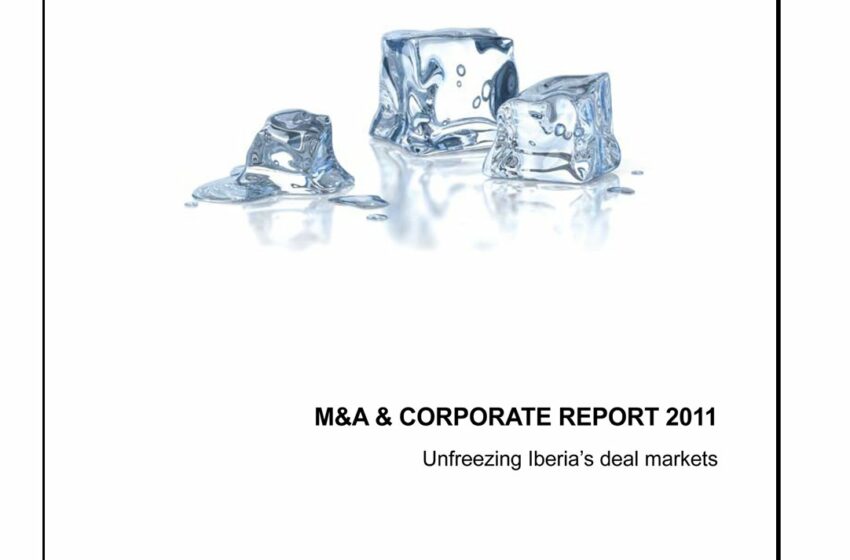M&A and Corporate Report 2011: Unfreezing Iberia’s deal markets
A look at the Iberian deal tables over recent years indicates a dramatic drop-off in M&A activity across Spain and Portugal. The value of completed deals is down to less than a quarter of what it was in 2007, while the volume of deals is around a half on the same period. But the figures tell only part of the story of what is happening in the transactional markets, say lawyers across Iberia.
There is still transactional activity although deals are taking much longer to close and terms are tougher to negotiate. There is less public company M&A but interest in trade and private company sales continues. It is access to finance however that is the major obstacle to overcome, they say. Cash may be “king”, but all sides of a deal are now more careful about committing, with investor sentiment in the second half of 2011 significantly down on the start of the year.
Trampled shoots
At the peak of the corporate boom, in 2007, Iberian deal value reached €121bn with 430 recorded deals over the course of the year according to MergerMarket. This fell to €51bn over 419 deals in 2008 and to €26.4bn across 356 deals in 2010. The figures for 2011 mark a relative upturn in value, to €48.7bn, but a sharp fall in volume, with only 282 deals recorded, and only 25 to date in the fourth quarter.
Such a reduction reflects not only the rise in barriers to completing a transaction, but also the decline in investor confidence across Spain, Portugal and the entire eurozone, say lawyers.
“When we opened in 2007 there was little hint of the scale of the crisis that was to unfold, and while we were perhaps initially shielded from the worst of the downturn nobody is now immune. There is truly a ‘new normal’ and we have to adapt to it,” says José Luis Blanco, Managing Partner of Latham & Watkins in Spain. 
As regards M&A, the result is much fewer and generally smaller transactions. “Those deals we do see progress very slowly or are aborted due to a lack of financing or the seller’s reluctance to accept lower prices. In the last quarter of 2011 we have also seen many auction sales cancelled or put on hold,” says José Maria Balañá, Head of Corporate at Hogan Lovells in Madrid.
Spanish and Portuguese banks, now facing their own cash-raising issues, are unwilling to underwrite leveraged deals and acquirers have to put up much more of their own money. Prospective purchasers are inevitably more selective not only over their targets but the terms on which deals are concluded.
“In general terms, the economy is not doing well and the green shoots that we may have seen several months ago are no longer there. However, we do see activity in deal flow,” says Víctor Xercavins, Head of Corporate and M&A at Cuatrecasas in Barcelona.
Such a scenario is the result of two trends, say lawyers. Companies that are struggling are now more acutely aware of a need to merge, to strengthen their balance sheets; while those in better shape may be finally beginning to explore new investments.
“There is a sense of over-capacity at all levels of the economy and some companies feel that if they can survive the coming year, and watch more competitors fail, they will emerge in a much stronger market position,” says Juan Francisco Falcón, corporate Partner with Uría Menéndez in Madrid.
Privatisation processes
For lawyers in Portugal the same general situation prevails, but the demands of the country’s €78bn financial bailout by the European Union, European Central Bank and International Monetary Fund is driving a rise in corporate and deal activity.
“Deal volume in Portugal would probably be at its lowest rate for a decade if it were not for the privatisations,” says Helena Vaz Pinto, Corporate Partner with Vieira de Almeida (VdA) in Lisbon. “The wider trend is one of a move from an acquisition-led market to being restructuring-led. We are seeing depressed companies maneuvering in a depressed market.”
Under the terms of the bailout, the Portuguese Government is however required to sell its holdings in major companies like energy utility EdP and the electricity and gas distributor REN, privatise entities such as the airports operator ANA, national airline TAP and elements of the rail and postal system, and to encourage the divestment of non-core areas among the domestic banks. All of which has to be completed over 2011-2012.
Such a development is clearly having a disproportionate, albeit welcome, impact on the volume of activity and investor interest in the market.
“The wider deal situation has not changed significantly. Smaller operations still come up, but mostly as ‘side effects’ of worldwide operations, restructuring or new business ‘opportunities’,” says Fernando A. Ferreira Pinto, Corporate Partner with mid-size firm Sérvulo.
The Portuguese Government is reportedly now exploring the possibility of delaying some sales, to encourage higher prices, and Morais Leitão Galvão Teles Soares da Silva (MLGTS) may be the only firm publically announced as leading a privatisation (of longstanding client EdP), but almost all Lisbon’s leading firms are exploring client opportunities.
To date however only the sale, of nationalised bank Português de Negócios (BPN), has been completed – the local arm of Angolan Banco BIC emerging the winner in a €40m deal (advised by PLMJ opposite Cuatrecasas Gonçalves Pereira for the Government).
In Spain the privatisation process is less frenetic. The sale of airports operator AENA (advised by Cuatrecasas) and the separate concession rights to Madrid Barajas and Barcelona El Prat airports are delayed but still happening, for the time being. There is a sense of reluctance from bidders to meet the established sales prices, while the recent general election and change of Government may yet prompt changes to the process.
“We are seeing reports that some bidders are willing to pay less than half of what the previous Government was proposing,” says Fernando de las Cuevas, corporate Partner with Gómez-Acebo & Pombo (GAyP) in Madrid.
Spain’s proposed €7bn IPO of 30 percent of the State Lottery (Loterías y Apuestas del Estado) has already been postponed, because of a lack of international investor confidence and political opposition. However further sales are expected, as regional and municipal Governments look to raise cash and reduce debt.

Regulated opportunities
Despite the ill economic winds that are blowing many deals off course, the current economic environment is nonetheless generating some new opportunities, although few Spanish or Portuguese law firms say they are expecting to generate significantly larger workloads.
A recent report on international companies’ deal strategies by Hogan Lovells and the Financial Times found that over 80 percent of those surveyed are focusing on organic growth, although over half said that they remained open to the possibility of acquisitions. Likewise, the M&A focus is increasingly towards regulated business sectors.
“Certain investors are taking advantage of those opportunities that are being created by the market volatility and there is a degree of consolidation underway in many sectors,” says Pedro Pérez-Llorca, Senior Partner with Pérez-Llorca in Madrid. He is currently leading the advice for Banco Pastor in its acquisition by Spain’s fifth largest bank Banco Popular (advised by Cuatrecasas Gonçalves Pereira) in a deal valued at €1.3bn.
“The sense is that there is, relatively speaking, less risk in regulated businesses and it is in areas like finance, telecoms and aviation that we are seeing more deals being completed,” agrees Federico Roig, Corporate Partner with Cuatrecasas in Madrid.
The same banks that are unwilling to release capital into the transactional markets have nonetheless emerged as significant M&A players over the past year, at least in Spain. The major banks had to reach 10 percent core capital ratios by the start of October, and such a demand coupled with the financial fragility of many institutions’ balance sheets, had prompted a wave of merger activity – reducing the number of Spanish cajas (savings banks) from 43 to 15 as well as prompting asset sales.
Newly formed Liberbank – the product of a merger by Cajastur, Caja Extremadura and Caja Cantabria – recently sold an 85 percent stake in broadband group Telecable to US private equity giant Carlyle for €400m. This deal saw Freshfields and DLA take sides against Linklaters.
“For the right cash-generating assets, and where sellers are keen to make a deal, there are buyers who are willing to inject more of their own funds to finance transactions, and for which bank financing has also proved to be available,” says Alejandro Ortiz, the Linklaters Partner who advised Carlyle.
“Some of the financial optimism of the beginning of the year has faded but there are still transactions, and as banks and saving institutions have to get more cash in their balances, presumably more transactions will come,” agrees Diego Loranzo, corporate Partner with Ramón y Cajal in Madrid.
Portugal’s banking system may also yet see sell-offs and consolidation, suggest some. With share prices in banks such as Millennium BCP now a fraction of only a few years ago, the sector offers enticing although complex acquisition opportunities.
“We are seeing more new deal structures, including all-equity deals and swaps, but these are only viable if the shares are worth having,” says José Diogo Horta Osório, Corporate Partner with Cuatrecasas in Lisbon.
A year of two halves
The one issue overhanging the Spanish and Portuguese economies and which lawyers, bankers and Governments have so far been unable to overcome is international investors’ falling confidence in the euro.
“We saw activity before the summer driven mainly by privatisations or investors looking at opportunities at more adjusted prices,” says Juan Barona, corporate Partner with Allen & Overy in Madrid. “Subsequently, we are feeling the same slowdown experienced in other markets due to the uncertainties surrounding the public debt crisis and the prevailing restrictions on capital.”
There is no avoiding the wider “atmospheric conditions”, agrees Mónica Martin De Vidales, corporate Partner with Garrigues.
“Up until September I was still relatively optimistic about the volume of activity for M&A teams at Spanish firms, due to the apparent interest by foreign investors in taking stakes in the financial entities after the integration of the cajas and divestments of investees, portfolios and assets. But the apparent intensity of investment has not crystallized and there has been a gradual slowdown in operations since September”, she says.
The recent general election may yet however begin to help recover confidence, suggest others. The victorious Partido Popular are more inclined to make the necessary structural economic changes, notably relating to Spain’s labour laws, than the ousted socialist PSOE.
“After the elections there should be more clarity in the markets but whether that alone is sufficient remains to be seen,” adds de las Cuevas at GAyP. “There remains a considerable amount of over-capacity in the economy and the necessary adjustments have to be made.”
In contrast to Spain, the Portuguese Government’s privatisation programme has prompted a moderate upturn in transactional mandates over the second half of the year, say lawyers there.
“This is inevitably being led by asset and subsidiary disposals and insolvency-related M&A, but privatisation-related work has helped. Likewise, the deleveraging process being undertaken by Portuguese banks will attract investment interest. We are at least optimistic in terms of deals related to privatisations, banks and distressed M&A,” says Miguel de Avillez Pereira, Partner and Head of Corporate M&A with Abreu Advogados
But while the Government may be going beyond even the terms of the bailout Memorandum, in cost-cutting and disposals, Portugal cannot escape the wider eurozone and finance concerns.
“Even some of the major assets put up for sale are not attracting the expected bids. And the bank sales that we are seeing are not on their own sufficient to raise their capital levels to that now required by national and international guidelines,” says Diogo Leónidas Rocha, Corporate Partner with Garrigues in Lisbon.

Barriers to entry
In Portugal, a banking consolidation will likely present significant competition concerns and while banks’ own credit ratings continue to fall. Already the proposed divestment of Caixa Geral’s insurance business is delayed pending ongoing regulatory issues.
It is therefore not a question of being either optimistic or pessimistic but “realistic”, says Pedro Pinto, Partner of pbbr in Lisbon. “The general feeling is that the austerity package we are experiencing will have to be accompanied by economic measures (and not just financial budgetary measures) aimed at creating conditions and signs for a recovery.”
In any event, a recurring issue is a lack of acquisition finance and the mismatch between buyers´ and sellers´ price expectations that prevents more successful transactions, say lawyers. “A prevailing presumption among many acquirers is that ‘tomorrow it will be even cheaper’,” says Horta Osório at Cuatrecasas.
Fundamentally it comes down to a lack of belief in the business forecasts underwriting targets prompting ever-deeper due diligence. Or paradoxically there may even be reluctance among acquirers to acknowledge the value a merger may bring.
Last year’s buyout by Telefónica of its partner Portugal Telecom’s (PT) stake in Brazilian mobile operator Vivo proved so high, €7.5bn, because of the potential that full ownership gave it, says Leónidas who advised PT. “Some prices are only holding up – and arguably influencing other sellers in the market – because of the tremendous strategic advantage a deal offers.”
One area where values are relatively much easier to fix and transactions simpler to close is in trade sales. “Industrial clients are now taking the opportunity to invest in strategic targets, at more realistic values, as they are absolutely aware of the sectors and their trends where they invest,” says José Blanco, Corporate Partner with Simmons & Simmons in Madrid.
Such a difference highlights banks’ approach to risk. They are more conservative and require ever-stronger guarantees. “The result is that those transactions fully financed with equity are becoming more common and easier to complete, provided that the parties agree a reasonable valuation,” says Roberto Pomares, Partner with SJ Berwin in Madrid.
Cash is king
Deal funding may be difficult to attract in Spain but the situation has proved even more challenging in Portugal, say lawyers there.
“Most of the transactions we have been involved with this year have not involved ‘new’ financing. These are times where one can literally say that ‘cash is king’,” says Manuel Santos Vítor, Managing Partner of PLMJ.
Again, the major challenge is assessing value and belief in future business projections. “Any transaction that involves differed payments on future results is now much more difficult than before,” adds fellow corporate Partner Vasco Ataide Marques.
Credit conditions have worsened and it is more expensive to get financing. “This continues to be one of the main barriers to more dynamic or aggressive buying strategies. Deals take longer to negotiate and it is very usual to provide for extended payment conditions as an alternative to overcome funding limitations,” says Vaz Pinto at VdA.
Companies’ assets have now moved from a position where they were over-valued to being undervalued, say some. “There are now no easy transactions. But while they may be doomed to face several obstacles it doesn’t mean that they won’t succeed,” says Carolina Coelho da Silva with Raposo Bernardo in Lisbon.
The resulting impact is however that companies may struggle to grow by integration and lose out on good M&A opportunities. “The mismatch in respect of asset and company values continues to be a deal breaker, while the difficulty in getting financing plays a key role in many deals not moving forward,” says Avillez Pereira at Abreu Advogados.
Foreign affairs
One consequence of a tighter domestic finance environment is however that those deals undertaken by foreign acquirers, and with funds secured outside of Spain and Portugal, are proving easier to complete, say many. But clearly foreign investment is much-reduced.
According to a recent Allen & Overy survey on investment flows, Foreign Direct Investment (FDI) into Spain totalled $24.5bn in 2010, well below the peak of $73.3bn in 2008, almost matching the 2005 level of $25bn.
Deals such as the recent €115m acquisition of Spanish Bimbo bakery chain by the Mexican Bimbo Group highlight a clear preference for strategic targets, as well as the driver behind the availability of many assets – the vendor, Sara Lee is restructuring to move away from the bakery business.
“There is interest by Spanish companies to invest abroad to be more resilient to the turmoil in the domestic market, and interest among international companies to invest in Spain, but at cheaper prices or for specific assets,” suggests Carlos Jiménez de Laiglesia, Head of Corporate at Simmons & Simmons in Madrid.
The situation in Portugal is again a little different. The privatisation process there is generating significant levels of international interest, albeit few potential investors are willing to pay the “off the shelf” prices being suggested by the Government.
In Portugal, the situation again is a little different. The privatisation process is attracting a significant upturn in foreign interest.
The sale of the Government’s 21 percent stake in energy utility EdP has led to a shortlist of four preferred bidders: Germany’s E.ON, China’s Three Gorges Corp, and Brazilian state-run power holding company Eletrobras and Cemig, controlled by the Brazilian state of Minas Gerais. Likewise, the privatisation of the state electricity and gas distributor REN has reportedly seen the UK’s National Grid, Abu Dhabi’s IPIC, Colombia’s ISA and Cypriot financial group Tufton Oceanic present bids. In addition, the sale of national airline TAP is rumoured to have particularly interested Brazilian state airline TAM and British Airways/Iberia.

International perspectives
A depressed economy at home, coupled with continuing demand for new growth and finance options, is inevitably pushing more Spanish and Portuguese companies abroad. But companies are still being selective. Many are also looking to hedge against upheavals in the eurozone and focusing on new markets in Asia, the US and Latin America, including Brazil.
“Brazil’s economy has experienced excellent growth in the last few years and still offers promising growth potential to all types of investor. Transactions are easier to complete in this environment,” says Iván Delgado at Pérez-Llorca.
Telefónica’s battle for control of ViVo was followed by PT’s acquisition of a €3.8bn 22.45 percent stake in Telemar’s Oi. Most recently, Galp has sold a 30 percent $5.2bn stake in its local operation to China’s Sinopec.
“Deals flow both ways, in and out of Portugal. The more robust or sophisticated corporate groups have done their homework and expanded to foreign markets where they see a competitive advantage and long-term opportunities,” says Ana-Sofia Batista, Partner and Head of Corporate M&A with Abreu Advogados, which firm is known to be now exploring its own options in Brazil.
Portuguese businesses across all sectors are inevitably looking to capitalise on their lusophone ties, notably in Africa where there is arguably less sophisticated competition but prospects of dramatic economic growth. Indeed, there is growing investor interest in the transport and manufacturing sectors as people and trade flows increase, say some.
“The current situation has been a strong incentive for companies to intensify their activities worldwide, looking for new opportunities, with a special focus on the Brazilian and other Portuguese-speaking countries, such as Angola and Mozambique, where the number of deals – particularly related to major public infrastructures – is increasing and definitely easier to complete,” says Diogo Perestrelo, co-Managing Partner of Cuatrecasas in Lisbon.
But many also caution that international expansion is no panacea for all companies’ domestic problems.
“Under normal circumstances, the Iberian export sector is very stable. But our experience in past crises shows that more small and mid size companies are looking to substitute activity lost in the internal market, with business abroad – but profit-making activities often take more time than expected, and the margins are thinner than at home,” notes, José Antonio Suárez, Managing Partner of Spanish firm Suarez de la Dehesa, which has an office in Morocco.
Complexity
The lack of leveraged finance has notably reduced deal size and the ability of private equity funds – key drivers in the transactional markets – to continue deal-making.
But such developments reflect the willingness of market players to adapt to change, note others. “Only one or two years ago parties would freeze when faced with issues such as a lack of bank financing or the risk of ‘clawback’ actions, now they have learnt to deal with them and seek out alternative solutions,” believes Jordi Maristany, Corporate Partner with Deloitte Abogados in Spain.
Others inevitably also point to the challenges that reduced deal activity is having on Iberia’s legal market. “We are not an island and no more immune to the economic situation than any other sector, so we too have to adapt,” says Bernardo Abreu Mota, Partner with CS Associados in Lisbon, which recently celebrated its second anniversary.
But despite the evident market difficulties that 2012 will likely bring, Spain and Portugal may yet see some very large transactions, suggest some. Governments continue to progress privatisation progammes and even the largest businesses are feeling the economic squeeze, while new private equity, distressed debt and infrastructure funds have begun to cautiously enter the market.
“Lawyers are amazingly resilient and even in light of the market conditions in which we now operate many firms will come out above average. I’m of course concerned and we think our firm is as well-prepared as we can be for the coming year, but like our clients we will simply have to adapt,” concludes Pedro Cardigos, Principal of Lisbon corporate and finance firm CARDIGOS.
Few corporate lawyers are openly optimistic about the deal prospects ahead, but in the bad times as well as the good there will inevitably continue to be activity.
|
Private equity – no longer business as usual Over the past decade, the private equity sector had emerged as a major transactional engine across both Spain and Portugal. But the economic downturn, a reduction in leveraged finance, and longer deal negotiations have inevitably combined to impact negatively on the sector. |












